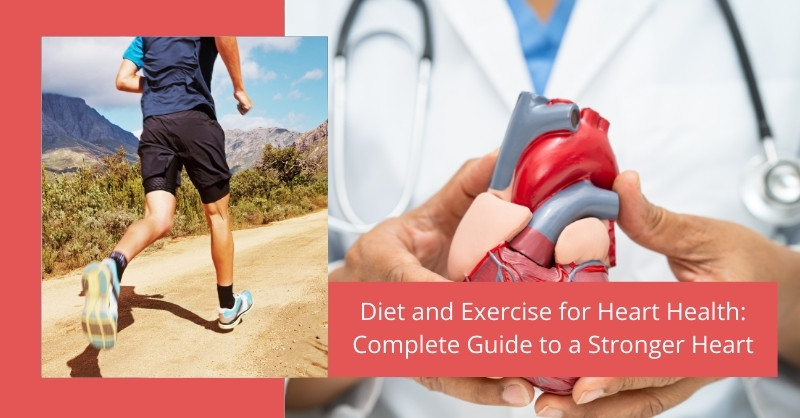The Importance of Diet and Exercise for Heart Health
Diet and exercise for heart health are crucial in maintaining a strong and resilient heart. Your heart is a powerful muscle, tirelessly working to pump blood throughout your body. However, it is also one of the organs most susceptible to poor lifestyle choices. For instance, poor nutrition and physical inactivity contribute to conditions such as hypertension, high cholesterol, and heart disease. Consequently, it’s essential to incorporate a heart-healthy diet and regular exercise into your routine to support overall cardiovascular health.
Diet and Exercise for Heart Health: Nutritional Guidelines
A heart-healthy diet emphasizes nutritious, whole foods, while simultaneously minimizing unhealthy fats, added sugars, and excessive sodium. Below are key points that you should focus on to make healthier dietary choices:
- Fruits and Vegetables: Rich in antioxidants and fiber, these foods help lower cholesterol levels, thus preventing arterial plaque buildup. Therefore, aim to include a variety of fruits and vegetables in your meals.
- Whole Grains: Choose brown rice, quinoa, oats, and whole-grain bread for sustained energy, better digestion, and improved long-term health.
- Healthy Fats: Include sources like olive oil, avocados, and fatty fish rich in omega-3 fatty acids. These fats help reduce inflammation and improve cholesterol levels.
- Lean Proteins: Opt for chicken, fish, tofu, and legumes instead of red or processed meats. As a result, this will support long-term heart health.
- Low Sodium: Limit your salt intake by avoiding processed foods and using herbs, lemon juice, and spices for flavor instead. This will help control your blood pressure.
- Stay Hydrated: Drinking plenty of water throughout the day supports overall circulation and reduces strain on the heart. Therefore, make water consumption a priority.
Diet and Exercise for Heart Health: Foods to Limit for Optimal Heart Function
Some foods can have a detrimental effect on heart health. Thus, try to minimize or avoid the following:
- Trans Fats and Saturated Fats: Found in fried foods, baked goods, and processed snacks, these fats can lead to heart disease.
- High-Sodium Foods: Canned soups, fast food, and frozen meals often contain excessive salt. By avoiding these, you can maintain healthy blood pressure.
- Sugary Drinks: It’s best to limit sodas, energy drinks, and sugary beverages. This will help avoid the adverse effects of high sugar intake.
- Refined Carbs: Foods such as white bread, pastries, and sugary cereals can lead to spikes in blood sugar. Consequently, they are best avoided for long-term health.
Diet and Exercise for Heart Health: Recommended Exercises

Regular physical activity is essential for cardiovascular health. In fact, it improves circulation, reduces blood pressure, and strengthens the heart muscle. Here are some of the best exercises that contribute to heart health:
Aerobic Exercise
Engaging in aerobic activities such as walking, running, swimming, or cycling increases your heart rate and improves cardiovascular endurance. For optimal benefits, aim for at least 150 minutes of moderate-intensity aerobic exercise per week. Alternatively, you can aim for 75 minutes of vigorous exercise. Consequently, your heart will become more efficient.
- Brisk walking or jogging
- Dancing or Zumba
- Rowing or cycling
Strength Training
Strength or resistance exercises help build muscle, improve metabolism, and control blood sugar levels. Therefore, include strength training at least twice a week, focusing on all major muscle groups.
- Bodyweight exercises such as push-ups and squats
- Lifting dumbbells or using resistance bands
- Gym workouts targeting both the upper and lower body
Flexibility and Balance Exercises
Practices like yoga and tai chi not only enhance flexibility but also reduce stress, promoting heart health indirectly by encouraging relaxation and mindfulness.
Maximizing Heart Health Benefits Through Diet and Exercise

A heart-healthy lifestyle combines both good nutrition and regular exercise. Together, they work synergistically to:
- Reduce Cholesterol Levels: By lowering LDL (bad cholesterol) while raising HDL (good cholesterol), this combination helps maintain healthy cholesterol levels.
- Lower Blood Pressure: Improved circulation reduces strain on artery walls, which, in turn, contributes to lower blood pressure.
- Manage Weight: This approach helps prevent obesity and promotes a healthy body composition by boosting metabolism.
- Improve Blood Sugar Levels: Diet and exercise help prevent or manage Type 2 diabetes, which plays an important role in heart health.
- Reduce Stress: While physical activity releases endorphins that enhance mood, a balanced diet can stabilize emotional well-being, thereby reducing stress.
Sample Heart-Healthy Meal Plan
Here is a one-day meal plan to help you get started with your heart-healthy lifestyle:
Breakfast
Start your day with oatmeal, topped with a tablespoon of chia seeds, sliced banana, and a handful of blueberries. Pair it with green tea or black coffee without added sugar for a wholesome start.
Morning Snack
Enjoy a small apple with a tablespoon of almond butter. This combination provides protein and fiber for sustained energy throughout the morning.
Lunch
Prepare grilled salmon with a mixed greens salad, cherry tomatoes, cucumbers, and an olive oil-lemon dressing. Add a slice of whole-grain bread on the side for extra fiber and energy.
Afternoon Snack
Carrot and celery sticks with hummus make a nutritious and filling afternoon snack.
Dinner
Bake a chicken breast seasoned with garlic and rosemary. Serve it with steamed broccoli and a half-cup of quinoa. End your meal with a small bowl of mixed berries for added antioxidants.
Evening Snack
Wind down with a small handful of unsalted almonds or sunflower seeds for a healthy late-night snack.
Creating a Sustainable Diet and Exercise Plan for Heart Health
Consistency is key when adopting heart-healthy habits. To ensure sustainability, set realistic goals and take gradual steps. Here are some tips to help you stay on track:
- Meal Prep: Plan and prepare meals in advance to avoid unhealthy choices and ensure a balanced diet.
- Schedule Workouts: Set aside specific times for exercise each week to establish a consistent fitness routine.
- Listen to Your Body: Adjust intensity levels as needed to prevent burnout or injury, ensuring a safe and effective workout.
Additional Lifestyle Tips for a Healthy Heart
Stay Hydrated
Proper hydration is important for maintaining optimal blood flow, which ultimately reduces strain on the heart. Therefore, be sure to drink water consistently throughout the day.
Avoid Harmful Habits
Smoking and excessive alcohol consumption are known to have negative effects on heart health. Consequently, quitting smoking and moderating alcohol intake can greatly improve your heart’s function and overall well-being.
Get Quality Sleep
Adequate sleep is essential for the repair and recovery of your body. For optimal health, adults should aim for 7–9 hours of quality sleep each night.
Manage Stress
Excessive stress can elevate blood pressure and strain your heart. Consequently, practicing mindfulness, meditation, or deep breathing exercises can help reduce stress.
Stay Active Throughout the Day
Even light activities such as stretching or taking short walks can improve circulation and contribute to heart health. Additionally, avoid sitting for long periods of time, as this can affect blood flow.
The Long-Term Impact of Diet and Exercise on Heart Health
Focusing on diet and exercise for heart health doesn’t just reduce the risk of cardiovascular diseases—it also offers numerous benefits. Some of the key long-term benefits include:
- Increased energy levels, which improve productivity and overall quality of life
- Improved mental health, with reduced symptoms of anxiety and depression
- Enhanced longevity, allowing you to live a longer, more fulfilling life
- Greater physical endurance and strength, promoting long-term fitness
- Better management of chronic conditions, such as diabetes or hypertension
By committing to these lifestyle changes, you’re investing in a healthier, happier future. Start today, and give your heart the care it deserves.



